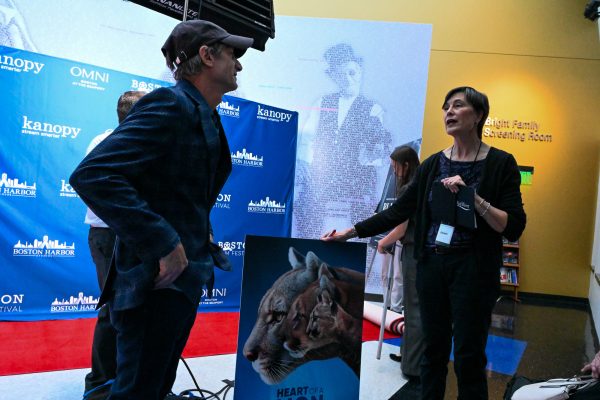
JOSEPHINE KALBFLEISCH
A photographer directs the team members of “Hidden: The Kati Preston Story,” and Kati Preston in the red top.
Documentaries exploring human experience and the natural world took center stage on screens at the Boston Public Library, Emerson Paramount Center and Rockport Music-Shalin Liu Performance Center for the 41st annual Boston Film Festival from Sept. 18-22.
The majority of the festival’s selections featured nonfiction films with a strong emphasis on the natural world, with four being nature-related documentaries and eight being based on true events.
“For more than four decades, the Boston Film Festival has not only entertained and enlightened but also elevated vital voices and sparked conversations that matter,” said Robin Dawson, executive director of the festival, in a press release.
In the first half of a double film event, “Gangsta Gardener,” a documentary co-directed by Rocky Romano, focused on “the rebel with a green thumb” and guerrilla gardener, Ron Finley. In the short film, which premiered Saturday afternoon, Romano explored wider questions about food insecurity for children.
“There’s a lot of important messages in the film that are overlooked, especially just the lack of quality food for our kids,” Romano said to a panel.
Finley works as an activist spreading awareness about food deserts through planting gardens and increasing access to fresh produce in affected areas.
“Hidden: The Kati Preston Story,” the second half of the double feature, focused on Preston’s time in Hungary during the 1944 Holocaust, told through the perspective of her five-year old self.
In a time where Holocaust education is being questioned in schools across the United States, Preston spoke directly to the crucial nature of educating students on the genocide at a Q&A session after the screening.
“There is a lot of hatred at the moment,” Preston said. “It’s more than ever important to speak about it … because when people remember history, they cannot repeat it.”
Featured on the same day as the double feature was “Heart of a Lion,” a documentary created to dispel common myths about mountain lions according to the film’s director Joe Pontecorvo.

Frequently, mountain lions who kill livestock are typically euthanized by federal and state employees, as explained by Mark Elbroch, the narrator of the film and mountain lion biologist.
“The assumption is that if a mountain lion kills once, it will kill again,” Elbroch said. “There is no evidence that that’s true, and we generally don’t have any data one way or the other because we kill them so fast.”
The film focuses on two mountain lion mothers who Elbroch has tracked for years in his role as Panthera Puma program director, a nonprofit organization devoted to providing information on pumas. Both Elbroch and the lions go on an adventure starting from Jackson, Wyoming, to the Olympic Peninsula, in Washington state.
Keeping with the conservationist theme, “The Last Dive,” centers around 83-year-old navy veteran Terry Kennedy and his friendship with a massive manta ray “Willy” around the Revillagigedo Islands in Mexico.
Kennedy brought awareness of illegal fishing of these rays to the Mexican government, which contributed to the area becoming a Biosphere Reserve.
“One thing I love about Terry is that he’s a unique conservationist,” said director Cody Sheehy. “I don’t know that many Hell’s Angels that end up having a story with the impact like what he had.”
The festival’s closing night featured “Ambleside,” a film exploring love across class divides in 1925 Mauritius.
The script is based on the love story of the producers of the film Alan and Maria Jesus Govinden. Though Alan passed away before the film’s screening, he was honored throughout the premiere.
“I’m quite sure that my father’s here somewhere, and I’m sure that he’s exceedingly proud of everybody who’s put passion into this project,” said his daughter, Julia Govinden.
Filmed during the COVID-19 pandemic, “Ambleside” faced setbacks throughout the filming and production process, but Director Mitch Jenkins said that it ended up being beneficial.
“This film is really a testament that if you believe in something and you really want it, nothing in this world can stop you,” Govinden said.